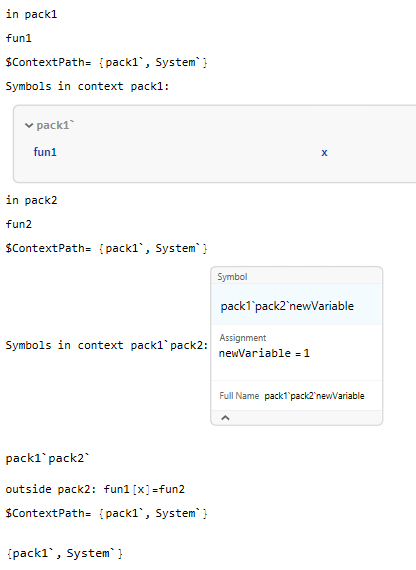Suppose I begin a package:
BeginPackage["MyPackage`"];
Before running this command in a fresh kernel, the context and path were:
$ContextPath->$Context
{"System`", "Global`"} -> "Global`"
and afterward:
{"MyPackage`", "System`"} -> "MyPackage`"
Now if I were to declare a function Fun1:
Fun1::"usage" = "Fun1[]";
The context of Fun1 is obviously Context[Fun1]:
"MyPackage`"
Now if I begin a subcontext inside this context:
Begin["`Private`"];
Now my context and path are:
{"MyPackage`", "System`"} -> "MyPackage`Private`"
Now if I try to define a new function with the same name Fun1 here in the subcontext:
Fun1[arg_] := 1 + 1;
It gets defined in "MyPackage`" context whilst clearly the current context right now was "MyPackage`Private`".
If I were to use a different name say Fun2 here then it gets defined in the subcontext as expected:
Fun2[arg_] := 1 + 2;
Why is that? I am trying to understand the rules governing this. Does it mean if you are in a subcontext and there is a symbol with the same name existing in the outer context then the current context given by $Context is ignored if you define without using full context name?
MyPackage`Private`Fun1[arg_] := 1 + 3;
was the effect I was expecting. Is this rule general in terms of how deeply nested the current context is compared to where the symbol with the same name exists in the outer context?
I have a second question regarding BeginPackage second argument:
BeginPackage["MyPackage`",{"Package1`","Package2`"}]
is this the same as:
Needs["Package1`"];
Needs["Package2`"];
BeginPackage["MyPackage`"];
or
BeginPackage["MyPackage`"];
Needs["Package1`"];
Needs["Package2`"];
Also are there any cases where in a multipackage paclet, these can produce different results, i.e. the order in which Needs are called relative to BeginPackage matters?
Also, does these do something different?
Needs["`MyPackage`"];
BeginPackage["`MyPackage`"];


$ContextPathtells you where the evaluator will look for symbols. If you evaluate a symbol and that symbol isn't found in$ContextPath, then it will be "created" and "assigned" to the$Context.Beginchanges the$Contextbut not the$ContextPath.BeginPackagechanges both.Endreset them back to what they were, andEndPackageresets them but also adds the just created context to$ContextPath. $\endgroup$